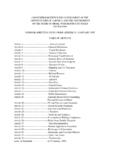Transcription of OECD Secretary-General report to G20 Finance …
1 OECD Secretary-General report TO G20 Finance MINISTERS AND CENTRAL BANK GOVERNORS Buenos Aires, Argentina March 2018 OECD Secretary-General report TO THE G20 Finance MINISTERS AND CENTRAL BANK GOVERNORS BUENOS AIRES, ARGENTINA MARCH 2018 This report contains two parts. Part I is a report on the activities and achievements of the OECD s tax agenda, and is made of two subparts: looking back at significant achievements and looking ahead at the further progress needed, in particular through the Inclusive Framework on BEPS. Part II is a Progress report to the G20 by the Global Forum on Transparency and Exchange of Information for Tax Purposes. This document and any map included herein are without prejudice to the status of or sovereignty over any territory, to the delimitation of international frontiers and boundaries and to the name of any territory, city or area.
2 The statistical data for Israel are supplied by and under the responsibility of the relevant Israeli authorities. The use of such data by the OECD is without prejudice to the status of the Golan Heights, East Jerusalem and Israeli settlements in the West Bank under the terms of international law. Note by Turkey: The information in this document with reference to Cyprus relates to the southern part of the Island. There is no single authority representing both Turkish and Greek Cypriot people on the Island. Turkey recognises the Turkish Republic of Northern Cyprus (TRNC). Until a lasting and equitable solution is found within the context of the United Nations, Turkey shall preserve its position concerning the Cyprus issue . Note by all the European Union Member States of the OECD and the European Union: The Republic of Cyprus is recognised by all members of the United Nations with the exception of Turkey.
3 The information in this document relates to the area under the effective control of the Government of the Republic of Cyprus. OECD 20183 PART I OECD Secretary-General report TO G20 Finance MINISTERS AND CENTRAL BANK GOVERNORS 5 Over the past decade the international community, with the support of the G20, has made enormous strides in redefining the international tax landscape. The tax principles underpinning the global financial system have moved from opacity and incongruity to transparency and coherence; from countries working on their own to enforce a patchwork of rules towards a model of co-ordinated efficiency. The era of bank secrecy is over. A new standard of automatic exchange of information has been agreed by over 100 jurisdictions. The Base Erosion and Profit Shifting (BEPS) Project has set the tone for international tax rules that are fair and ensure that tax is paid where value is created.
4 New rules and changing standards have led to a vital discussion on tax certainty so that we take into account their impact on investment and innovation. While tax sovereignty is a core feature of national identity, the scale of interconnectedness and cross-border activity means that when governments act alone, this sovereignty may be only nominal. Unilateral action can never provide a complete solution. Through the OECD/G20 Inclusive Framework on BEPS (the Inclusive Framework) with its 113 members and the Global Forum on Transparency and Exchange of Information for Tax Purposes (the Global Forum) with its 149 members, the international community has built a new institutional framework that reconciles the concept of tax sovereignty with multilateralism, establishing a blueprint for policy-making in a globalised world.
5 The key challenge for the coming years is to nurture this new institutional framework and to leverage its full potential by maintaining the multilateral dynamic that has been the driver of its considerable achievements. In spite of past successes there are emerging tensions which may damage the unprecedented level of co-operation and, however difficult these emerging topics may be, it is more important than ever that G20 countries work together for their own benefit and for the benefit of the world. 1. Looking back: significant achievements in 2017 The past year saw considerable progress on a number of fronts in international taxation as the international community moved from policy-making to implementation. On BEPS, tax transparency and our work with developing countries, 2017 saw countries bring policy to life. a) BEPS implementation The implementation of the BEPS Project is underway.
6 Since the adoption of the BEPS package in 2015 and the establishment of the Inclusive Framework in 2016, countries are taking action on many fronts, including on BEPS actions that go beyond the 4 minimum standards. For example, the international provisions of the recent tax reform in the US include measures that not only implement BEPS actions on interest deductibility and anti-hybrid rules, but also impose a minimum tax on certain foreign income. Ensuring implementation and a global level-playing field is vital to making sure the era of double-non taxation is truly over and the peer review processes of the four BEPS minimum standards have started. In-depth evaluations have been completed to assess the implementation of BEPS Action 5, covering both the exchange of tax ruling information (with over 11000 rulings already identified and now being exchanged) and the identification of harmful preferential regimes (with over 160 regimes already reviewed, many of which have already been amended, and over 90 which are now in the process of being amended or abolished).
7 On BEPS Action 13, on the implementation of Country-by-Country reporting (CbC reporting) obligations 6 over 60 jurisdictions already have a comprehensive domestic legal framework for CbC reporting in place, with around 55 jurisdictions requiring or permitting the filing of CbC reports in 2016, including the headquarter jurisdictions of substantially all MNE groups above the EUR 750 million revenue threshold and over 1400 exchange relationships activated; and on BEPS Action 14 dealing with the improvement of mutual agreement procedures (MAP), 21 jurisdictions have already been subject to peer reviews, 8 are currently underway, and 43 more have been scheduled through December 2019. Furthermore, jurisdictions began reporting their MAP statistics under the MAP Statistics Reporting Framework and the statistics for the year 2016 have already been published.
8 Important steps were reached in June 2017 and in January 2018, on the occasion of the first and second signing ceremonies of the Multilateral Convention to Implement Tax Treaty Related Measures to Prevent BEPS, also known as the BEPS multilateral instrument . This instrument embodies the very essence of multilateralism. With 78 jurisdictions having signed to date, it already covers over 1 200 bilateral tax treaties that will be updated to implement several of the BEPS measures. To enter into force, the BEPS multilateral instrument needs to be ratified by five jurisdictions. With Austria, the Isle of Man, Jersey and Poland, only one more ratification is needed for it to become hard law. More jurisdictions are expected to sign and ratify the instrument in the coming months, with an overall objective to modify up to 2 500 existing bilateral agreements.
9 BEPS Action 6 requires jurisdictions to prevent the granting of treaty benefits in inappropriate circumstances, which can be implemented by participating in the BEPS multilateral instrument or through bilateral treaties. As many jurisdictions will only ratify the BEPS multilateral instrument or bilateral treaties implementing the minimum standard in 2018, the review of the implementation of the minimum standard on treaty-shopping will only begin in 2018. The terms of reference and methodology for these reviews have already been agreed. In the meanwhile, the membership of the Inclusive Framework continues to grow, with 113 members working on an equal footing to develop guidance and monitor the implementation of the BEPS package. Following the release of the first Inclusive Framework on BEPS s Progress report in July 2017, a new overall update on the work on BEPS will be presented to G20 Finance Ministers and Central Bank Governors in July 2018.
10 B) Tax transparency The work of tax transparency has been at the heart of the OECD s role in the international tax area. With its peer reviews of the standard for exchange of information on request (EOIR) and its monitoring of the implementation of the standard for automatic exchange of financial account information (AEOI), the Global Forum has played a crucial role in establishing and maintaining a level playing field and in ensuring that the voices of all relevant jurisdictions are heard. A key milestone was reached in 2017 with the completion of the 1st round of peer reviews of the exchange of information on request (EOIR) standard. Following a call by the G20 in 2009 to establish a rigorous and in-depth peer review process to ensure a rapid implementation of the EOIR standard, the Global Forum finalised detailed reviews with overall ratings for over 100 jurisdictions.
















